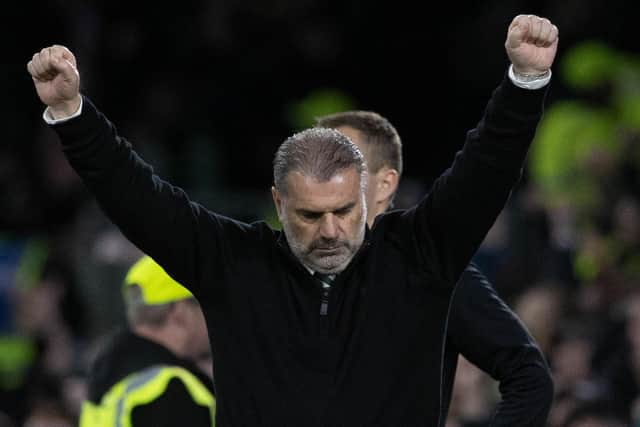Celtic boss Ange Postecoglou on Rangers gap, 'ludicrous' title claims and making 50 changes
The Celtic manager knows only too well that momentum is a mercurial quality. It can be lost as easily as it can be found. His team benefitted last season when Rangers encountered difficulties after initially setting the pace.
A year ago this week, Celtic beat Dundee 4-2 at Dens Park to move into second place, four points behind Rangers. Postecoglou insisted afterwards that Celtic were still “nowhere near the levels they need to be at” having dropped points in their previous league game against Livingston and after allowing Dundee to score twice in an entertaining game.
Advertisement
Hide AdAdvertisement
Hide AdThe same applies now, he insisted, after another 4-2 win, this time against Dundee’s city rivals Dundee United, saw Celtic stretch their lead at the top to seven points. Rangers’ surprise defeat to St Johnstone the following day means that remains the situation at the top heading into the penultimate round of fixtures before the break for the World Cup.


“I was pretty consistent last year in saying that looking at a table and trying to predict the outcome at this stage is just ludicrous,” said Postecoglou. “Yeah, we’re seven points ahead but we were four points behind a year ago and won the league by four points.
“Nothing changes. It’s not because I’m dismissive of it. Obviously we are in a strong position but we need to push on, because, even though there’s been a lot of games, the reality of it is that we are only a third of the way through the season. The majority of it is still to come.”
Postecoglou has turned into the Tinkerman to navigate Celtic’s recent splurge of fixtures, something he suggested is out of character for him. He has made as many as 50 personnel changes to his starting XIs in the last 11 games since a 2-0 defeat to St Mirren. Only two, Matt O’Riley and Reo Hatate, have started every match.
“Under any sort of normal circumstances, even in those circumstances, it’s probably too many,” admitted the manager. “I was really conscious of us getting through this period with as many fit bodies as possible so we had the energy to make sure it didn’t affect our performances.


“I think every time I’ve made six or seven changes, even though I’m putting in fantastic players, it affects the cohesion of the team. Credit to the lads, we’ve found our way through that. The alternative for us was to rely on a core group of players.
“We went through this last year and I remember going into games with barely enough players to fill a bench and calling up kids from our B-team for numbers to play in the first team. For me, it was a balance between ‘how can I ensure we are strong through this and don’t lose too many players through injury?’ without it affecting the cohesion of the team.
“Did I get it right? I think for the most part, yes. But I’ve got no doubt that if the games were more spaced out and I made less changes, I think our form would have been even stronger.”
Comments
Want to join the conversation? Please or to comment on this article.